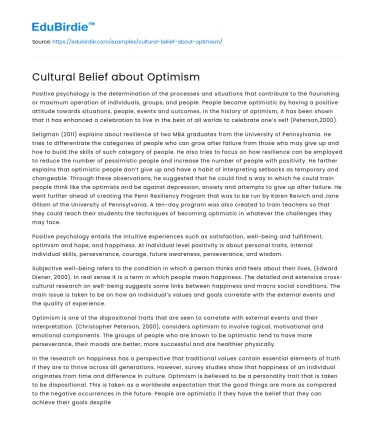Positive psychology is the determination of the processes and situations that contribute to the flourishing or maximum operation of individuals, groups, and people. People become optimistic by having a positive attitude towards situations, people, events and outcomes. in the history of optimism, it has been shown that it has enhanced a celebration to live in the best of all worlds to celebrate one’s self (Peterson,2000).
Seligman (2011) explains about resilience of two MBA graduates from the University of Pennsylvania. He tries to differentiate the categories of people who can grow after failure from those who may give up and hoe to build the skills of such category of people. He also tries to focus on how resilience can be employed to reduce the number of pessimistic people and increase the number of people with positivity. He farther explains that optimistic people don’t give up and have a habit of interpreting setbacks as temporary and changeable. Through these observations, he suggested that he could find a way in which he could train people think like the optimists and be against depression, anxiety and attempts to give up after failure. He went further ahead of creating the Penn Resiliency Program that was to be run by Karen Reivich and Jane Gillam of the University of Pennsylvania. A ten-day program was also created to train teachers so that they could teach their students the techniques of becoming optimistic in whatever the challenges they may face.
Save your time!
We can take care of your essay
- Proper editing and formatting
- Free revision, title page, and bibliography
- Flexible prices and money-back guarantee
Positive psychology entails the intuitive experiences such as satisfaction, well-being and fulfillment, optimism and hope, and happiness. At individual level positivity is about personal traits, internal individual skills, perseverance, courage, future awareness, perseverance, and wisdom.
Subjective well-being refers to the condition in which a person thinks and feels about their lives, (Edward Diener, 2000). In real sense it is a term in which people mean happiness. The detailed and extensive cross-cultural research on well-being suggests some links between happiness and macro social conditions. The main issue is taken to be on how an individual’s values and goals correlate with the external events and the quality of experience.
Optimism is one of the dispositional traits that are seen to correlate with external events and their interpretation. (Christopher Peterson, 2000), considers optimism to involve logical, motivational and emotional components. The groups of people who are known to be optimistic tend to have more perseverance, their moods are better, more successful and are healthier physically.
In the research on happiness has a perspective that traditional values contain essential elements of truth if they are to thrive across all generations. However, survey studies show that happiness of an individual originates from time and difference in culture. Optimism is believed to be a personality trait that is taken to be dispositional. This is taken as a worldwide expectation that the good things are more as compared to the negative occurrences in the future. People are optimistic if they have the belief that they can achieve their goals despite the difficulties they may be facing and considered to be pessimistic if they believe that they cannot face the problems and achieve their goals.
Particularly, some have concluded that optimism brings forth positive effect which in return creates an approach that make such people to feel more empowered and focused towards their work and career goals. Therefore, the people have that belief that optimism is more likely to have positive results. To be more specific, they have a belief that having an optimistic attitude will increase performance especially when one works towards a predefined goal that may have high chances of success. People believe that optimism can do magic and do benefit others regardless of being in direct control of their outcomes through their own actions.






 Stuck on your essay?
Stuck on your essay?

